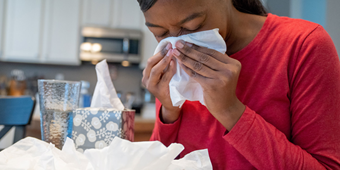Can You Outgrow Asthma?

Find Your Perfect Match
Answer a few questions and we'll provide you with a list of primary care providers that best fit your needs.
You can develop asthma at any time in your life. It’s possible not to have asthma as a child and develop it later as an adult. It’s also possible to have long periods where asthma is inactive, and then have symptoms return later in life.
The Tendency for Asthma
Most people who have asthma were born with a tendency toward the condition. Once you have developed sensitive airways, your respiratory tract tends to stay sensitive to asthma triggers for life. That doesn’t mean that you’ll always be bothered by your asthma. But it does mean that if you had it as a child, even if you seem to have “outgrown” the condition, you very well may experience symptoms again as an adult.
Experts have studied the condition enough to now know that we don’t really outgrow asthma.
As You Grow
When children’s airways mature, they naturally become better able to handle inflammation (swelling) and irritants that bother the airways. That means as they grow, some kids may have fewer asthma symptoms or be less bothered by their condition. It’s common for kids to appear to have outgrown asthma by the time they enter school.
But experts have studied the condition enough to now know that we don’t really outgrow asthma. In fact, once you have asthma, you have it the rest of your life. According to the Asthma and Allergy Foundation of America, about 50 percent of kids with the condition seem to outgrow it once they reach or go through their teen years. But, about half of those children whose symptoms went away during their teens have asthma symptoms reappear when they’re older.
Adults who had asthma as children typically have found that their asthma symptoms vary throughout adulthood. Symptoms can range anywhere from mild to severe. Your asthma might return with symptoms similar to what you experienced as a child. But they could also be less serious or much more severe than what you remember from childhood.
As Your Child Grows.jpg?Status=Master&sfvrsn=71a88033_0)
In caring for children with asthma today, it’s important to know that there is no way to predict whether your child’s symptoms will gradually get better as he grows up. Likewise, there’s no way to predict if your older child with inactive asthma will have symptoms reappear in adulthood. Older kids who still have asthma symptoms are less likely to lose them as they grow.
If your child has a history of asthma, be aware of her sensitivity to airway irritants, as new triggers may cause symptoms to appear at any time.
Find Your Perfect Match
Answer a few questions and we'll provide you with a list of primary care providers that best fit your needs.
Source: Asthma and Allergy Foundation of America, New England Chapter; American Academy of Pediatrics




